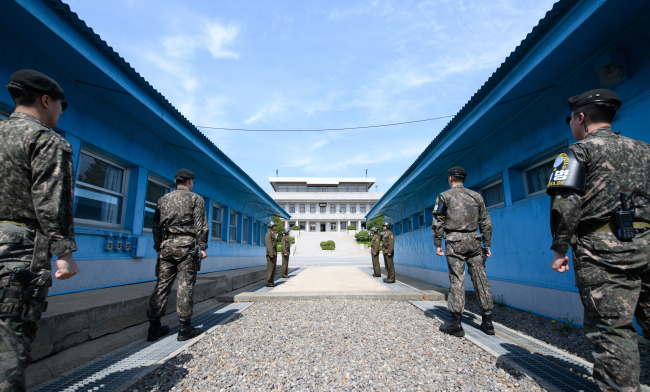[Newsmaker] All eyes on Panmunjeom
Regional powers keen on preserving their interests as Moon and Kim engage directly
By Jung Min-kyungPublished : April 26, 2018 - 16:25
[2018 Inter-Korean summit] All eyes on Panmunjeom
With the inter-Korean summit on Friday forecast to pave the way for denuclearization of the Korean Peninsula, the event is being keenly watched by all those seeking to sit down at the negotiating table with North Korea.
For the participants of the now-defunct six-party talks -- including the United States, China, Japan and Russia -- the meeting between South Korean President Moon Jae-in and North Korean leader Kim Jong-un could serve as a guide and a preview of what is to come. Despite sharing the goal of initiating talks with the North, the regional powers have varying expectations of the Moon-Kim summit.

The United States, which is expected hold a separate meeting with the North in May or June, voiced optimism for the Moon-Kim summit, with US President Donald Trump extending his “blessing” to the Koreas earlier this month for their efforts to end the decadeslong war. Officially ending the 1950-53 Korean War by replacing the armistice agreement with a peace treaty is a key agenda item at Friday’s summit, according to the South’s presidential office Cheong Wa Dae.
But skepticism continues to loom over North Korea’s abrupt shift in stance to discuss its nuclear program, given its track record of entering into agreements and then reneging on them. The US’ goal is to dismantle the North’s nuclear program in a complete, verifiable and irreversible manner, but Pyongyang has asked South Korea and the US to take “progressive and synchronous” steps instead.
A significant gap remains between the US and North Korea’s positions on the path toward denuclearization and it is South Korea’s role to close the gap, experts said. Friday’s summit is expected to become a crucial stepping stone and a barometer for the Trump-Kim summit.
North’s communist ally China, on the other hand, received the news of the summit with open arms, without casting doubts on Pyongyang’s true motives.
A day ahead of the summit, an editorial published in China’s state-run newspaper People’s Daily said that expectations are growing for a successful inter-Korean summit.
China is in line with the international community’s efforts for denuclearization, but at the same time has been pushing for what it calls a “freeze-for-freeze” agreement, a simultaneous halting of North Korean nuclear and missile tests and joint military exercises by South Korea and the US.
“Both the US and China are aiming toward denuclearization of the North, and hope to maintain their sphere of influence over the process of reaching peace on the Korean Peninsula,” said Shin Beom-chul, a senior fellow at the Asan Institute for Policy Studies.
“For nearly 70 years, the US has been trying to maintain influence by keeping US troops on the peninsula, while China has been trying to do the same by pushing them out. North Korea has been recently silent on the issue of US troops, but there are concerns that it may be a ploy to reassure the US at the table, only to side with China at the last minute.”
Last month, North Korean leader Kim Jong-un made his diplomatic debut with a trip to Beijing, where he met his Chinese counterpart Xi Jinping. It was in his meeting with Xi that Kim expressed his willingness to talk about denuclearization with the US.
Japan and Russia have shown a relatively lukewarm response toward Friday’s meeting, but they are focused on establishing their positions in the various stages of pursuing peace on the peninsula.
Despite Kim’s latest vows to halt the North’s missile tests and scrap its main nuclear test site, Japanese Prime Minister Shinzo Abe said that Kim’s pledge would not change how Japan deals with the regime, according to Kyodo News.
Japan has been asking Moon and Trump to raise the issue of Japanese nationals kidnapped by North Korean agents in the 1970s and 1980s, and is closely watching how the issue is dealt with at the summit.
Shin said that if noteworthy progress on denuclearization is made within the timeframe of the Moon-Kim and Trump-Kim summits, then there is a strong possibility of the resumption of six-party talks.
The six-party talks, which began in 2003 involving the two Koreas, China, Japan, Russia and the US, have been suspended since 2009 when Pyongyang pulled out, protesting the United Nation’s condemnation of its nuclear and missile programs. China had chaired the multilateral dialogue.
Japanese media reported that Kim expressed willingness to return to six-party talks in a conversation with Xi in Beijing.
“For now, the core issue is to lure out the most basic form of the North’s willingness to denuclearize and it may be too early to include Japan and Russia,” Shin said.
“The six-party talks are probably the most definite way of wrapping up the ongoing negotiations over the North’s denuclearization. But how the US might think of China joining the talks and what North Korea may think of the talks is unclear at the moment.”
By Jung Min-kyung (mkjung@heraldcorp.com)







![[Weekender] How DDP emerged as an icon of Seoul](http://res.heraldm.com/phpwas/restmb_idxmake.php?idx=644&simg=/content/image/2024/04/25/20240425050915_0.jpg&u=)



![[KH Explains] No more 'Michael' at Kakao Games](http://res.heraldm.com/phpwas/restmb_idxmake.php?idx=644&simg=/content/image/2024/04/28/20240428050183_0.jpg&u=20240428180321)







![[Herald Interview] Mistakes turn into blessings in street performance, director says](http://res.heraldm.com/phpwas/restmb_idxmake.php?idx=652&simg=/content/image/2024/04/28/20240428050150_0.jpg&u=20240428174656)
